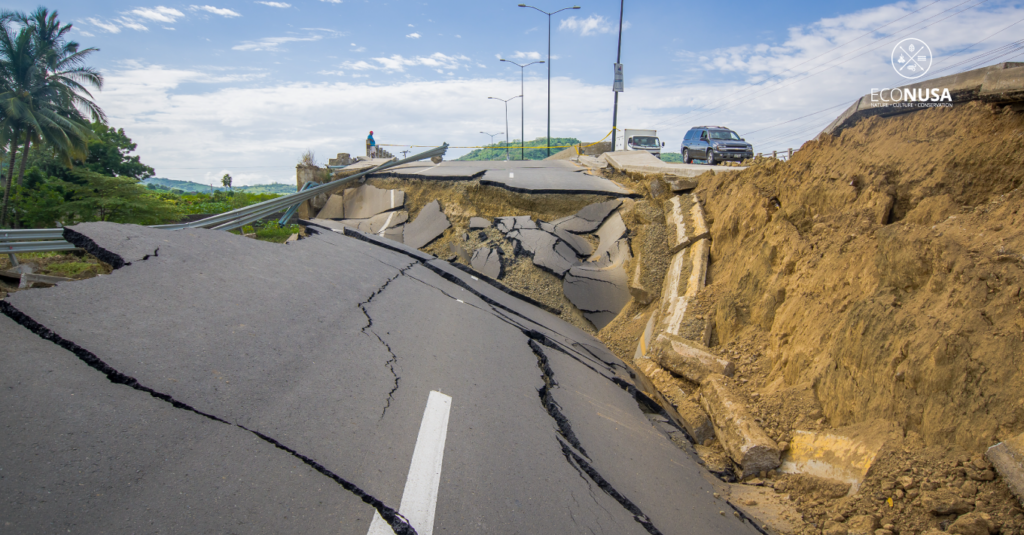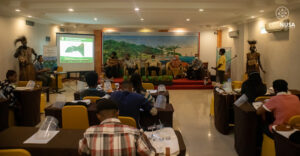
The first month of 2023 shakes the Land of Papua with earthquakes in Jayapura, Papua. An earthquake with a magnitude of 4.9 occurred on Monday, January 2, 2022, at 01.24 AM, eastern Indonesia time (GMT+9). Head of the Earthquake and Tsunami Center, Meteorology, Climatology and Geophysics Agency (BMKG) Daryono said the earthquake that occurred was centered on the mainland at a distance of 14 kilometers northeast of Jayapura City, Papua at a depth of 10 meters. That was not the only earthquake, as there were more than 800 aftershocks with various magnitudes, and are still being recorded until Thursday, January 19, 2023.
Read also: Extreme Weather, Alarm to Perform Youth Action to Mitigate Climate
The earthquake unfortunately not only occurred in Tanah Papua but also happened in Maluku. On Tuesday morning, January 10, 2023, an 7.9 magnitude earthquake struck Maluku and surrounding areas followed by aftershocks. The earthquake, which was centered in West Southeast Maluku at a depth of 131 kilometers, generated a tsunami early warning for the Maluku and Southeast Sulawesi regions for more than an hour. The earthquake has collapsed many houses and buildings.
The BMKG identified 10,792 earthquakes struck throughout 2022 in Indonesia. 807 earthquakes were heavy and 22 destructive earthquakes occurred.
Climate Change Causing Earthquakes?
Climate change is known to lead to various natural disasters, such as extreme weather, floods, landslides, and droughts. But does the climate crisis also affect the occurrence of earthquakes?
Jane Cunneen, Adjunct Research Fellow at Curtin University said that climate change not only affects the weather and sea level but also has an impact on the movement of the earth’s plates. Other scientists say earthquakes, volcanic eruptions, major landslides, and tsunamis could be occurring more frequently due to climate change. “The climate crisis is affecting not only the oceans and atmosphere but also the entire earth’s crust,” said Bill McGuire, a volcanologist and Emeritus Professor of Geophysics and Climate Hazards from University College London.
Read also: Climate Change Threatens Fishermen, the Climate Justice Law is Crucial
According to McGuire, the earth and everything in it is an interactive system that influences one to another. Climate change that causes the melting of ice at the north pole makes the earth’s crust bounce back and triggers movements of the earth’s crust that cause earthquakes. When an earthquake occurs, the potential for underwater landslides also increases, which then results in a tsunami.
David Pyle, a scientist from Oxford University also stated that the slightest change in the mass of the earth’s surface and weather patterns also affect volcanic activity in general. This implies that climate change, which is closely related to weather patterns, is of course related to what happens to volcanoes.
Read also: Staying Relevant in 2023
Meanwhile, Chi-Ching Liu from the Institute of Earth Science at Taipei’s Academica Sinica also proved that there is a relation between climate change and earthquakes. Based on the results of his research published in the journal Nature in 2009, he saw that when a typhoon occurred in Taiwan, at the same time an undersea earthquake with a small magnitude occurred under the island. In his research, Liu explained, the reduced atmospheric pressure during typhoons makes earthquake faults in the earth’s crust move more easily, thereby increasing the potential for earthquakes.
Scientists also believe that since 1973, the arrival of the El Nino, a phenomenon of warming sea surface temperatures, is related to the frequency of underwater earthquakes with magnitudes 4 to 6. Increasing the water volume on the earth creates the increasing pressure of fluid flow in the pores of the rocks on the seabed. This is what then triggers a shift in the earth’s plates on the seabed, which causes earthquakes.
Read also: COP27 Egypt: Indonesia Leads by Examples
Climate change has long been known to cause a lot of damage and bring various threats to life on earth. This is a loud alarm for all of us to start taking action in efforts to adapt and mitigate climate change, in order to make the earth a better place to live in the future.
Bustar Maitar, CEO of EcoNusa Foundation believes that climate change is not a hoax. The Intergovernmental Panel on Climate Change (IPCC) has stated that we all must start taking steps to adapt and mitigate climate change. “We can play a role by becoming environmental influencers for the people around us. Do good things for the earth consistently so that other people will follow our actions,” said Bustar.




